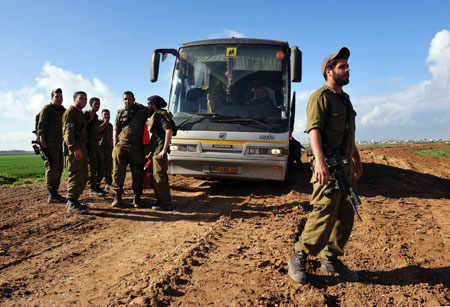The ceasefire is "fragile," and Israel will closely monitor the Gaza situation and are ready to handle any scenario, Olmert told his ministers on Sunday morning, stressing that Israel has the right to "react and renew its military actions if the terror groups continue firing."
 |
|
Israeli soldiers wait to go back by bus at Israel-Gaza border after returning from the Gaza Strip Jan. 18, 2009. [Rafael Ben-Ari/Xinhua]
|
"We can't talk about a timetable for withdrawal until we know the ceasefire is holding," said Olmert's spokesman Mark Regev.
In a letter to the troops, the army's Chief of General Staff Gabi Ashkenazi said that the objectives set for the Gaza operation "were met in full," but the operation "has yet to be concluded and the next several days call for us to remain alert and ready, until peace and quiet are restored to our cities."
Earlier in the day, Gazan militants fired at least 15 rockets at southern Israel, leaving two people injured, and Israeli warplanes bombarded the launching sites in response.
Exchange of fire also occurred in northern Gaza, and a Palestinian farmer was shot dead in southern Gaza by Israeli troops who claimed that he was approaching a military zone.
Should the two ceasefire initiatives hold, they would bring a pause to the three weeks of bloodshed across the Israel-Gaza border. Over 1,300 Gazans have been killed and over 5,500 wounded in Israel's massive onslaught, dubbed Operation Cast Lead, and 13 Israelis have also died.
A respite would also pay the way for a possible lasting truce deal between the Jewish state and the Islamist movement, as Egypt is leading the international efforts to reach the goal.
(Xinhua News Agency January 19, 2009)